| Article Overview:
Mr. Rogers is dead. I salute his death as I might a
war-buddy, as I might someone who dragged me out of a hail of bullets,
brushed me off, patched up my wounds, and urged me to "hang in there."
The famous author of thousands of hours of children's shows became my
"father mentor." He taught me how to love when I didn't know
quite how. I'll miss him. |
 VigilanceVoice VigilanceVoice
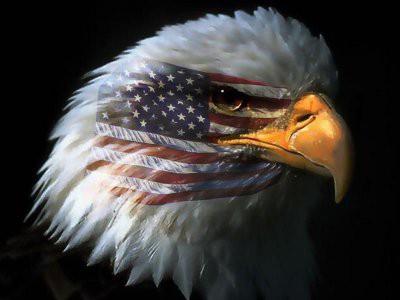
www.VigilanceVoice.com
Friday--February
28, 2003—Ground Zero Plus 534
___________________________________________________________
Why I Owe Fred Rogers A Kiss
___________________________________________________________
by
Cliff McKenzie
Editor, New York City Combat Correspondent News
|
GROUND ZERO, New York City, Feb. 28--Mr. Rogers is
dead. Strangely, he's the only man I've ever been jealous
of when it came to my children. I scoffed at him until I
caught my older daughter kissing his image on our television screen.
Then I began to take a second look at this "geeky character" with his
array of neighborhood friends, and slowly realized he was a Father of
Vigilance, teaching children how to feel safe from the Beast of
Terror.
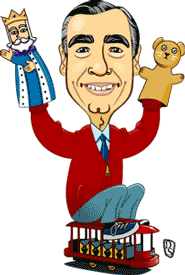 |
It was over thirty years ago that I first
met Fred McFeely Rogers. Our introduction wasn't face to
face. It came through my first daughter, who at the
time, was heading toward her second birthday. Mr. Rogers, the
daily television show for children from 2-6 years old, was new.
It had been on the air for only a couple of years, launching its first
program in 1968, the same year in which my daughter was born.
My wife worked as a hematologist at
Scripps Memorial Hospital in La Jolla, California. I was
writing at the time, and took on the joyful task of raising our
daughter in the morning. My wife went to work about 4 a.m.
and returned home at noon. Then I went off to write.
My job was to care for and entertain our older
daughter each morning--get her breakfast, play school with her, and
teach her.
I had grown up in a family that was very
dysfunctional, and had at an early age decided I was going to give my
children the quality of love I felt I didn't receive. I
was pouring it out to my first daughter, spending each morning as a
teacher-father, sculpting my daughter's mind and imagination as best I
knew how.
I had recently returned from Vietnam where I
served as a United States Marine Corps Combat Correspondent. I
had more than 100 combat operations under my belt, and by most
anyone's standards I was a "tough manly man." At the same
time, I had this soft spot in my heart for children, especially my
own. And I believed the precious commodity on earth was a
child's mind, and his or her heart. My mission was to fill my
daughter's head and heart so full of love she would receive all that
which I hadn't, plus a ton more.
Sesame Street was a new children's program,
based on learning interactives. Prior to joining the
Marine Corps I had been a senior in psychology at the University of
Oregon, working in the behavioral learning fields and considering
becoming a child psychologist. I had a wealth of information
about how to effect learning and used them all with my
daughter.
We would watch Sesame Street together. I
would interact with her when things were counted or the alphabet delivered
by Jim Hensen's magical muppets.. I prided myself that she could count and knew
her letters almost before she could walk.
I have a rather large ego. Some say
that they didn't make doorways to fit the size of my head.
I have to agree with their take. As far as I was
concerned, I was the Great Mentor, the Master of Knowledge.
I was King of Learning, not only of the academic kind, but also of
emotional love. I was hell-bent on insuring my
daughter would become the "richest of young women," filled with loving
knowledge's and wisdoms I imparted.
Then Mr. Rogers came along.
He shoved himself between me and my
daughter in a shocking way, one that forced me to step back and
examine who was really in charge of my daughter's education.
It happened one day when I was spinning the
television dial looking for something after Sesame Street.
I saw the little trolley cars Mr. Rogers used to move around his
neighborhood and a couple of puppets talking in trees. It seemed
inane enough, so I left it on while I washed the dishes, glancing into
the living room to keep an eye on my daughter.
I was drying the final dish thinking
about which flash cards I was going to use to start her working on
words when I glanced out and saw her kneeling in front of the
television, kissing the image of Mr. Rogers!
I heard her say: "I love you
Mr. Rogers!"
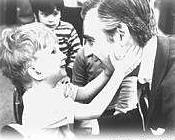 |
|
"I love you,
Mister Rogers." |
My heart sank.
I was being upstaged as the prime
emotional bread winner by some skinny, unkempt guy with a pair of
sneakers who spoke in a soft librarian's Voice, and was the farthest
possible image from the "testosterone man" as any former Marine war
vet could imagine.
Part of me flew into a jealous rage.
I wanted to rush to the television and scoop my daughter away and tell
her never to watch that "weird man" again, but I checked myself.
Fortunately, I had enough wisdom to bite my lip and realize that a
child's mind is a sponge, and that despite my prejudices that I wanted
to be the sole provider of emotional training, my daughter had a right
to chose her own friends, even at the earliest age, as long as those
friends were seeking the same goal as I--the evolution of her being.
That night I had a long talk with my
wife about Mr. Rogers. She was aware of him, and we had a
pact that when it came to raising the children we would agree on
everything. She assured me Mr. Rogers was a healthy influence
even though I secretly wanted her to excommunicate him as being a
"geeky role model." We laughed about my masculine
insecurity ala Mr. Rogers and I went to bed that night dreading the
next morning when I would be forced by own conscience to flip on Mr.
Rogers again. After all, my daughter had "fallen in love"
with him.
With a grimace, as though placing my
hand over a hot flame and holding it there, I switched channels to
Mr. Rogers Neighborhood at the proper time. My
daughter's eyes ignited.
I grouched and sat back on the couch,
folding my arms defiantly, as he strolled into the set, took off his
shoes, put on his tennis shoes and sweater. I laughed
because he buttoned up his vest sweater the wrong way. What a
dork, I thought. How could my daughter possibly see anything in
this guy.
But there she was, my sweet little
girl starry eyed, staring into the face of Mr. Rogers with a glow
about her as though he were some spiritual guru. His Voice was
gentle, caring, and he was talking to the camera lens with such
childish imagination it seemed to me he was on some kind of drug that
separated him from manhood to childhood.
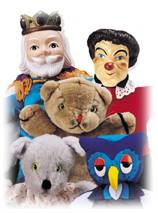
|
|
"Mister
Roger's" puppets |
Then there was the odd array of
characters-- Lady Aberlin, Chef Brockett, Officer Clemmons, Joe
Negri owner of Negri's Music Shop; Handyman Negri, Mr. McFeely , Mrs. Paulifficate
and Bob Dog.
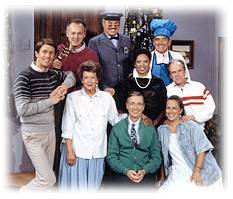 |
|
The cast of
"Mister Roger's Neighborhood" |
I wanted to gag.
Sesame Street was slick and articulate, and this show seemed corny and
non-educational. Where was the alphabet, I thought?
Where was the music? The neat production quality?
Slowly, I began to
realize that what Fred Rogers was teaching children was love.
Over months and months of watching him, I broke through my own
prejudices and ego to see a man who made children feel safe, secure,
loved.
Mr. Rogers taught me
something I didn't quite know how to do. He taught me how to be
a "gentle friend" to my daughter.
I knew how to be rough and
tough, but gentle and soft--that I didn't know.
Mr. Rogers applied sandpaper to
my rough edges as a father. He became role model of patience and
quiet concern, of fallibility, of friendship.
I have never had a man in
my life I could look up to as a mentor-father. The closest I can
come to is Fred Rogers.
Fred died
on February 27, and many sadly see his passing as the end of a legacy.
Over three decades and some 1,700 shows, he provided millions of
children worldwide a warm, loving example of parenting. His shows
were about making a child feel safe in his "neighborhood." He
signed off every program with the key words that I have made part of
my role as a parent: "You're a very special person, and I like
you exactly as you are."
This salute to a child's being
was enormously important to me. It suggested that not only a
child, but an adult, should not try to be somebody they are not.
They should let themselves evolve, and not try to fit themselves into
personality straight jackets to appease everyone else.
If there is one
gift I wanted to give my children, it was individuality--the right to
be their own persons despite any mould I might try to fit them in.
Fred Rogers made all the children who
watched his show special. He loved their souls, their
imaginations, their dreams.
Today, my wife and I enjoy two
beautiful daughters who are their own beings. One is a
social activist who works with disenfranchised and marginalized
people. She protests war and stands up for the underdogs in the
world. She recently earned her Masters in Divinity from Union
Theological Seminary in New York.
Our other daughter is
opposite in many ways. She is a federal special agent who
carries two 9mm Glocks and daily hunts down criminals seeking to
undermine the fabric of society. I joke that I have
two daughters, one of whom carries a gun and the other carries a
cross.
Each is special. Each is
exactly who they are.
I have to thank Fred Rogers for
teaching me to be a Parent of Vigilance. In so many ways
he shifted me away from trying to control my children's future to
being a stimuli for their growth as "special people.
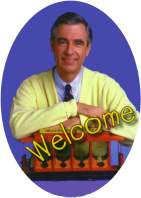
|
|
Vigilant
Statesman, Fred Rogers |
After
horrible events such as the assassination of Bobby Kennedy, the
Oklahoma City bombings, and the Nine Eleven attacks, Mr. Rogers went
on the air to calm and soothe the troubled souls of the children.
He provided what many call a "safe house" for their hearts, and opened
up his arms to hug them and remind them they were special, and to not
be afraid. He made them feel understood. Through his puppets and the
people in his neighborhood, he spoke not only to children but also to
their parents and educators as well.
If only the United Nations viewed his public
television show and learned the value of his special neighborhood,
perhaps the Parents, Grandparents, Aunts, Uncles, Guardians,
Politicians, Statesmen of its membership would vote to provide the
same kind of sanctuaries in their countries for all the Children's
Children's Children.
A Parent of Vigilance is one who teaches children
to fight Fear with Courage, to overcome Courage, to overcome
Intimidation with Conviction, and to drive away Complacency with Right
Actions that benefit the Children's Children's Children
Rogers was chairman of Family Communications,
Inc. the nonprofit company that he formed in 1971 to produce Mister
Roger's Neighborhood. It diversified into non-broadcast
materials that reflect his same philosophy and purpose: to encourage
the healthy emotional growth of children and their families. Mister
Roger's Neighborhood is the longest- running program on public
television.
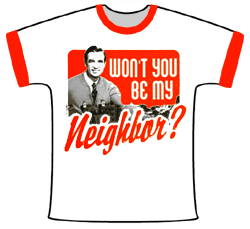 |
|
The child in
me will miss Mr. Rogers |
Even though his body has passed from
this earth, the wings of Fred Rogers flutter over the children.
I see him leading the Sentinels of Vigilance in their eternal quest to
protect the children from Terrorism's harm.
My child will miss him.
The little boy in me that needed to be told I was special just as I
was can hear him whispering those words even now.
Fred Rogers isn't gone.
He left us 3,000 episodes to pass on to our Children's Children's
Children. He left us the legacy of a Parent of Vigilance.
I owe him a kiss.
"It's a
beautiful day in this neighborhood,
a beautiful day in this neighborhood...
Won't you be my...won't you be my...
won't you be my neighbor"?
* * * * * * * * * *
Quote: When asked why he
devoted his life to children, Mr. Rogers's answer is typically direct
and simple. "Well, the children become adults," he said. "That's the
most important time with which we can nourish the future."
Quote:
(Comment made by Fred Rogers after a couple of college boys
drove across country to meet the real Mr. Rogers) "These
kids give you such hope," he said.. "Maybe they realize that you don't
have to be macho to be acceptable, and that everybody longs to be
loved and feel that he or she is capable of loving. I would hope that
is one of the major influences of the Neighborhood."
Quote:
"The underlying message of the Neighborhood," says Mister Rogers, "is
that if somebody cares about you, it's possible that you'll care about
others. 'You are special, and so is your neighbor'—that part is
essential: that you're not the only special person in the world. The
person you happen to be with at the moment is loved, too."

Feb 27--Terrorism & The Lilliputians
vs. Gulliver
©2001
- 2004, VigilanceVoice.com, All rights reserved -
a ((HYYPE))
design

|
|
|